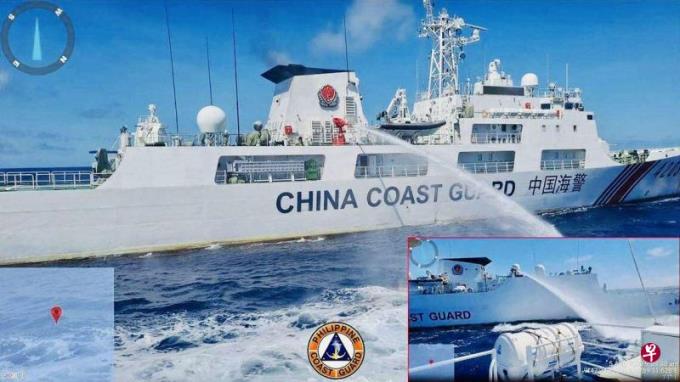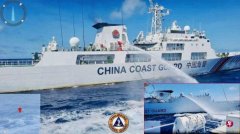
(Manila Comprehensive) The Philippines Sunday (August 6) accused the Chinese Maritime Police of the South China Sea intercepting the Philippine Coast Guard ship and supply vessels, and launched a water cannon to the Philippine ship.The Philippines condemned Chinese behavior as "illegal" and "danger".
The China Sea Police Department refuted that it is necessary to implement the necessary control in accordance with the law to deter the Philippines, and insist on illegally invasion of the Philippine ship, and carry illegal construction materials.
The U.S. State Department condemned China in a statement, saying that these actions were implemented by the Chinese Maritime Police and the "Maritime Militar", which directly threatened regional peace and stability.
The Philippines that are transporting food and water for military personnel in the reefs to strongly condemn China "dangerous operations"
The incident was on Saturday (5th). At that time, the Philippine Coast Guard was escorting two supply vessels to transport the Filipable Military personnel in the SECOND Thomas Shoal (China known as Renai Reef) in the Nansha Islands.Water, fuel and other materials.
The Philippine armed forces said in a statement that the Chinese maritime police ship blocking the Philippines and firing water cannons. Due to the Chinese "excessive and attack operations", the Philippines' second supply ship could not uninstall the materials for routine routine.Army rotation and supplies.
The statement said: "The Philippine Coast Guard strongly condemned the dangerous operation of the Chinese maritime police ship and illegally used water cannons to deal with the Philippine coast guards.The safety of the boat and violated international law. "
The statement also said: "We call on the China Maritime Police Station and the Central Military Commission to act with caution and be responsible for our actions to prevent the misjudgment and accidents of life."
The first time the Chinese water cannon has dealt with the Philippine supply ship since November of the year before the year before the previous year
This is the first time that the Chinese Maritime Police Ship has used a water cannon to deal with the supplies of the Philippines in Ayunjin Reef.
Gan Yu, a spokesman for the China Police Station, said that the Chinese maritime police ship implements the necessary control and control in accordance with the law to prevent the load of the Philippine ships wholve the illegal building materials.
Gan Yu said: "We urge the Philippines to immediately stop the infringement activities in this sea area. China has arbitrary sovereignty over the Nansha Islands including Renai Reef and its nearby waters.Continue to carry out law enforcement activities of rights protection. "
Manila and Beijing in the South China Sea, especially the sea disputes in the waters near Ayunjin Reef.Manila officially stranded in Ayunjin Reef in 1999 to deliberately put the landing ship during World War II, and dispatched military forces to settle in a regular basis to change shifts and transport supplies, which actually controlled Ayunjin Reef.
The United States: Chinese Actions directly threatened regional peace and stability
The United States stated that Beijing's actions were "the latest threat to the status quo of the South China Sea, which directly threatened the regional peace and stability" and reiterated that "we stand with the Philippine allies."The United States also said that other countries will launch a force attack on the Philippine official ships, planes, and troops, including the Philippine Coast Guard in the South China Sea, and the United States will quote the United States and the Philippines to protect the Philippines.
The Canadian Embassy in the Philippines also issued a statement that the actions of "resolutely condemning" the Chinese Maritime Police Ship said that Beijing's continued intimidation and coercion of neighboring countries destroyed the safety and stability of the entire region and increased the risk of serious misjudgment.
Mainland China has always advocated the sovereignty of almost the entire South China.



